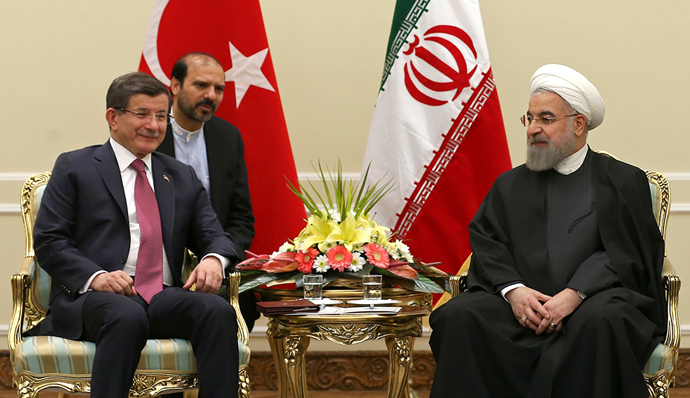By Mahmoud Ali
Dismissing Iran’s flagrant meddling in Middle East, forcing political and economic influence, threatening Arab Gulf countries prompting an Islamic Arab unified front to counter Persian perils, Turkey did not commit to its pledges of backing Saudi Arabia in face of any threats.
Ankara directed its attention to Tehran, with the intention of establishing joint ventures and economic and trade agreements. This was described by many analysts and observers as a joint economic alliance under a terrible storm of Arab-Iranian tensions.
Turkish Prime Minister Ahmet Davutoglu called Iran a “hidden treasure,” saying Tehran’s release from the “shackles of sanctions” has ushered in a “golden age” in relations between the two neighbors. Davutoglu, on the second day of a visit to Iran, made the remarks during a meeting of Iranian and Turkish traders and business owners in Tehran. These statements came amid tensions between Iran and Saudi Arabia- who leads an Islamic alliance to counter Iranian regional aspirations and expansion projects. They were received as well by many as an indication of the deep economic relations between both countries- away from politics- which represents a difficulty to Ankara, seeing Saudi calls on cutting ties with Tehran.
Despite Tehran-Ankara political differences- especially on the Syrian and Yemeni profiles- Turkish PM’s visit aimed at boosting economic relations. Davutoglu was accompanied by ministers of economy, energy, transport, communications and development, and both sides agreed on tripling joint trade exchange within 2 years.
Bilateral trade stood at $22bn in 2014 before declining to $9.7 billion as a result of sanctions on Iran, according to Turkish Statistical Institute. Davutoglu said the two countries can raise this volume to $30 billion.
“If we use existing capacities and bases, we can increase the volume of exchanges to more than $50 billion,” he said.
Thus, Turkey would be following in the steps of many European countries, with its keenness on benefitting from the Iranian $400bn- big economy, following the Nuclear Deal.
Turkey originally imports to Iran vehicles, equipment and steel and iron products. While, oil and gas represent 90 per cent of Iranian exports to Tehran, according to Turkish foreign ministry.
Moreover, Turkish ministry of economy expects to increase its exports to Iran, in fields of tourism, telecommunications, petrochemicals, transport, energy and banking. There is a chance to develop airports, highways, hotels and maritime shipment routes in Iran, said the ministry.
It was reported that a group of Turkish businessmen is set out to establish a giant centre for selling products. The Project will be built on 5,000 sqm in Tehran, under the name of «Turkish Trade Center».
In one of its kind Iranian- Turkish deal, Ankara had recently increased its Iranian gas imports, although it is more expensive than the Russian and the Azeri. But, this agreement came in exchange of privileges, which soon turned out to be a confidential gold deal, under which Tehran got gold from the other. In the past few years, their joint gold trade increased to tens of billions of dollars, after it was estimated at few millions in 2011.
Remarking on this cooperation, International and Economic Analyst Fady Eid said that Recep Tayyip Erdoğan wishes to restore, through approaching Israel and Iran, the Ottoman Empire.
Boosting the tripartite political and economic relations marks the dawn of a new era under the «Trident Alliance», signed by the 3 in 1959 and renewed in 1996. This agreement targets fencing off and undermining the Arab world economically and politically.


